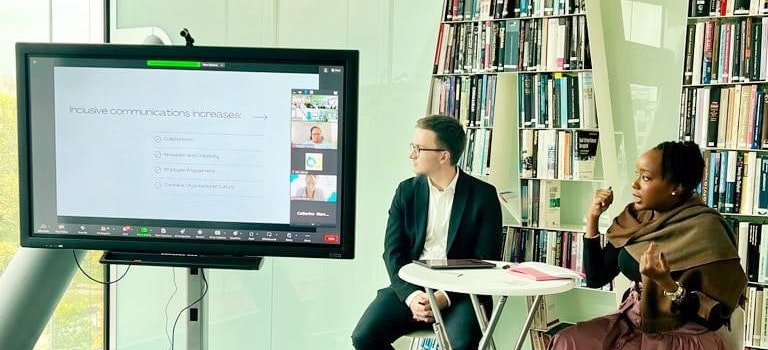In an increasingly interconnected world, the power of communications cannot be overstated. The ways in which individuals and organisations deliver essential messages – including the language, tone and visual elements used to communicate to external audiences – play an important role in shaping perceptions, guiding actions, and fostering connections across diverse communities. Adopting an inclusive, intersectional approach that recognises the rich tapestry of identities, experiences, and perspectives within our society is therefore key to breaking with existing stereotypes and leveraging positive impact.
On 16 November 2023, the IGC Secretariat hosted its 4th ‘Lunch and Learn’ event of the year, titled “Messaging That Matters: The Power of Inclusive Communications.” The event aimed to raise awareness, build consensus, and provide practical guidance on ethical story-telling and inclusive communications.
The event featured opening remarks by Ambassador Michèle Taylor, the US Permanent Representative to the Human Rights Council, followed by inputs from two inspiring speakers: Wathira Mbage, Associate Programme Officer of the Gender Equality, Diversity and Inclusion Unit at the International Trade Centre (ITC), and Natasha Kimani, Head of Partnerships and Research at Africa No Filter. Florian Eblenkamp, Advocacy Officer at the International Campaign to Abolish Nuclear Weapons (ICAN), moderated the discussion.

Ambassador Taylor emphasised the importance of reflecting diversity and intersectionality within women's representation in communications. “The frequency of our representation [in communications] must be matched by the depth of the portrayal,” she stated. Communications, according to Ambassador Taylor, have often perpetuated stereotypes of vulnerability and dependency and tended to simplify complex realities. But she also recognised that “the narrative is slowly, but pivotally shifting”. Ambassador Taylor further stressed the strategic importance of tapping into the potential of communications to deconstruct systems of power and amplify important messages related to diversity, equity and inclusion in the face of a global anti-feminist backlash.
Mbage, speaking from her extensive experience as a communications expert, showcased pathways for implementation of inclusive communications within the UN system, sharing insights and experiences from the ITC. She emphasised that “communications are a two-way interaction,” and that effective inclusive communications can enhance collaboration, innovation, creativity, employee engagement, and organisational culture. Inclusive communications, said Mbage, are key to represent the diversity among constituents and target audiences, and can open spaces for dialogue and learning. She also provided a sneak peek into the Communications Guidelines to be published by the ITC at the end of 2023. These guidelines, she noted, will not only underscore the need for accurate visual representation but also offer language guidance and definitions of relevant terms in key areas such as gender and sexual diversity, race, ethnicity and geography, decolonisation, disability, physical and mental health, and age.
Kimani, addressing the harmful narratives and stereotypes about Africa and African women, raised critical questions to underline the importance of ethical storytelling. “Africa has historically been portrayed through a lens of brokenness. We are not often afforded the luxury of nuance”. She pointed out that African women are often portrayed without contextualisation in terms of regions and locality, with narratives focusing on “individual and community deficits rather than their agency.” She urged organisations to represent individuals more accurately in their visual representation and communicate in a language familiar to the target audience. Concluding her speech, Kimani provided a list of eight actionable steps on how to implement ethical story-telling in practice, including engaging in critical self-reflection around personal privilege, ensuring respectful engagement with local partners, addressing implicit bias, and ensuring informed consent around the use of communications footage. “If you don’t have time to tell a story [with the depth and fairness it deserves], don’t tell it,” she remarked. To access Africa No Filter’s handbook “How to write about Africa in 8 steps. An ethical storytelling handbook”, visit their website.
Following the expert inputs, the audience engaged in meaningful discussion with the speakers, addressing issues such as implicit bias, the responsibility of international organisations in communications, particularly where local beliefs might conflict with organisational values, and the need to focus on women's agency rather than vulnerabilities in both text and imagery.

This event was part of the IGC 'Lunch and Learn' series, which aims to foster interactions between the IGC community, experts, academics, and activists. It is made possible by a grant from the US Mission and serves as a platform for dialogue and knowledge exchange. The events are open to IGC focal points, Champions and the broader public, including students.
